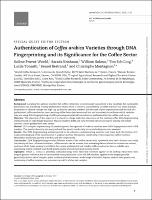Authentication of Coffea arabica Varieties through DNA Fingerprinting and its Significance for the Coffee Sector
Date
01-2020Author
Pruvot-Woehl, Solene
Krishnan, Sarada
Solano, William
Schilling, Tim
Toniutti, Lucile
Bertrand, Benoit
Montagnon, Christophe
Type
Artículo
Metadata
Show full item recordAbstract
Background: Locating the optimal varieties for coffee cultivation is increasingly considered a key condition for sustainable production and marketing. Variety performance varies when it comes to susceptibility to coffee leaf rust and other diseases, adaptation to climate change and high cup quality for specialty markets. But because of poor organization and the lack of a professional coffee seed sector, most existing coffee farms (and even seed lots and nurseries) do not know which varieties they are using. DNA fingerprinting of coffee planting material will contribute to professionalize the coffee seed sector. Objective: The objective of this paper is i) to check in a large scale the robustness of the existing coffee DNA fingerprinting method based on eight Single Sequence Repeats markers (SRR) and ii) to describe how it can help in moving the needle towards a more professional seed sector. Method: 2533 samples representing all possible genetic background of Arabica varieties were DNA fingerprinted with 8 SRR markers. The genetic diversity was analyzed and the genetic conformity to varietal references was assessed. Results: The DNA fingerprinting method proved to be robust in authenticating varieties and trace back the history of C. arabica breeding and of the movement of C. arabica varieties. The genetic conformity of two important coffee varieties, Marseillesa and Gesha, proved to be 91% and 39% respectively.
Keywords
URI (Permanet link to cite or share this item)
doi: 10.1093/jaocint/qsz003https://repositorio.catie.ac.cr/handle/11554/10314


